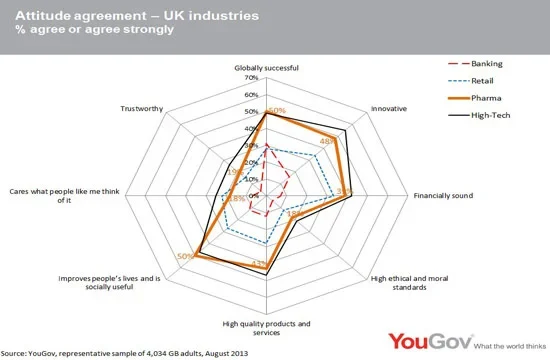Though the pharmaceutical industry in the UK suffers from many of the same reputational trust issues affecting other UK industries, it enjoys a higher level of favourability amongst the public, reflecting its importance to the health of the public and the UK economy.
New research by YouGov shows that whilst it is widely seen as playing an important role in society, the UK public think ‘Big Pharma’ is running a reputational deficit as it isn’t trusted and is seen as potentially focusing on increasing profits at the cost of maintaining ethical standards.
Concerns about the pharmaceutical industry which are shared with other industries include a public belief that it is too focused on profits, doesn’t pay enough corporation tax and pays executives too much. But more positively, its products are valued and it is seen as improving people’s lives and is socially useful, but these are things the public also relates equally to the high-tech industry.
Where pharma has an opportunity to raise its public standing is through interaction with public services, such as ‘Joint Working’ with the NHS, which a majority (55%) of Britons agree could “cut NHS costs or improve patient outcomes, while in return, companies increase their knowledge or even make a profit”. While there is a degree of scepticism in Britain towards any private involvement in public services, the public’s openness to the idea of pharmaceutical companies and the NHS working together presents a real business and reputation prospect for the industry if done right.

Socially Useful but maybe not Trustworthy
Improving people’s lives and being socially useful is where the industry scores well, with half (50%) of the public associating it with the sector. This matches the level of association it receives for being ‘globally successful’ (50%), and for being ‘innovative’ (48%). 43% go on to endorse the industry as producing ‘high quality products and services’.
Despite these scores, less than one in five say the industry is ‘trustworthy’ (19%) or has ‘high ethical and moral standards’ (18%), though it should be noted that these scores are higher than most industries achieve for these measures. It may be that the low score for ‘cares what people like me think of it’ (18%) provides an insight into why the public does not trust even an industry like pharmaceuticals, which it tends to think ‘improves people’s lives and is socially useful’ (50%).
“I know little about them, and have to admit a certain suspicion as to motives and actions.” Female, aged 69, East Midlands
Specific Attitudes: Profit versus Ethics
Where the pharmaceutical industry comes unstuck is that two thirds (65%) of the public believe it is ‘making bigger and bigger profits’ at a time when profits are not universally viewed positively.
The difficult relationship between ethics and commercialism is also seen in public perception of the interaction between doctors and pharma companies. Half (51%) of the public and 57% of Opinion Formers agree “I suspect many UK doctors are paid by pharmaceutical companies to prescribe some particular drugs to patients over other similar drugs”, while 15% and 20% respectively disagree.
“Doctors should be forced to put up prominent notices in their practices if they have ANY links with pharmaceutical companies.“ Female, aged 64, East of England
The Role of the Pharmaceutical Industry in the Future of the NHS
Although public trust of the pharmaceutical industry is relatively low, views about ‘Joint Working’ between the NHS and the industry gets a relatively positive reaction. 45% are pro the concept if there are clear NHS benefits, but only 19% are enthusiastic enough to believe this is the future and it will doubtless improve both the NHS and the UK pharmaceutical companies who take part. A quarter expects pharmaceutical companies to get more out of the arrangement than the NHS. Only 17% express concern that ‘Joint Working’ sounds too much like privatisation for their liking.
This positive acceptance is echoed by the majority (55%) agreeing “I have no problem with pharmaceutical companies working in partnership with the NHS in order to cut NHS costs or improve patient outcomes, while in return, companies increase their knowledge or even make a profit”, only 12% disagree. Agreement rises to 71% amongst Opinion Formers.
Within the sample for this survey were 72 NHS medical staff and 83 other NHS staff. Concern about ‘Joint Working’ rises to 24% amongst these NHS workers and is even higher (27%) amongst the medical staff. However a higher proportion of the medical staff (23%) than the general public also say ‘this has to be the future’.
“This 'Joint Working' is the way forward but it must be independently audited to make sure cures are not 'lost' or profit comes before patient care” male, aged 51, East of England









